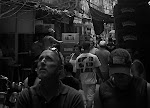

Around the time I finished the manuscript of Sultana I had a strange dream in which I was trapped inside a barn with a dying Union army mule during a hurricane. It was a bit of dreamland absurdity cobbled together from Sultana stimuli -- a mental exercising of fear, using bits and pieces of the story I’d been immersed in for more than a year.
The Sultana story is riddled with nightmare hyperlinks, but the fact that my dreaming brain attempted to interview the mule illustrates an inevitable challenge to fully grasping the experiences of those involved from such a great distance. We can read the official dispatches, the soldiers’ letters and journals, the memoirs and histories, and look at photos of certain episodes, but we can never see the story unfold before our own eyes, nor ask questions of those involved. All we can hope for is verisimilitude, which is to say, some representation of the truth based on our own interpretation of the information available to us.
For all those reasons I envied Sebastian Junger and Tim Hetherington while watching Restrepo, their film about a platoon of U.S. soldiers at a remote outpost in Afghanistan, which recently won the prize for best documentary at Sundance. Not only were Sebastian and Tim able to interview their subjects, they were able to experience their war firsthand, greatly expanding the information available to them, and to us. They were also shot at – an experience one soldier described as the ultimate high, and which is adrenalizing to watch, even on film. It’s hard to imagine how anyone could get any closer to revealing the truth of war.
Restrepo has been compared with The Hurt Locker, a fictionalized film about the Iraq war that has gotten rave reviews. But as Tim observed, after the soldiers get killed in The Hurt Locker they retired from the set with a cup of coffee, while those in Restrepo “never come back.” Restrepo is real. It is also surreal. No one could have dreamed up the scenes in which our guys – young, heavily inked American soldiers who alternately play acoustic guitar and listen to Drowning Pool on their ipods – awkwardly interact with an ancient, remote culture in which the village elders sport eyeliner and orange hair and beards. And that’s only the most obvious, superficial contrast. The beauty of Restrepo lies in its rawness – there’s no annoyingly omniscient, Ken Burnsish-voiceover, and in how we get to know these guys. When one of them gets killed it’s not about abstract war casualties; it’s both shocking and heartbreaking.
The film doesn’t consider the politics of the war in Afghanistan. It’s an effort, as Sebastian and Tim put it, to take the viewer on something like a 90-minute deployment there. The focus is the 30-man Second Platoon of Battle Company, part of the 173rd Airborne Brigade, which was stationed in Afghanistan’s Korengal Valley. Sebastian, best known as the author of The Perfect Storm, and Tim, a war photographer whose previous work includes the film An Uncivil War, about Liberia, traveled to the Korengal a total of 10 times between May 2007 and July 2008 as part of a series of stories for Vanity Fair magazine and ABC News. The Korengal was considered one of the most dangerous postings of the war, and the Second Platoon built and manned a remote and strategic outpost there that they named Restrepo in honor of their medic, PFC Juan Restrepo, who was killed in action. The area was a crucial relay point for the Taliban.
Sebastian and Tim officially unveiled the film to friends and family at a theater in Chelsea last night; its official release comes this fall, when it will air on the National Geographic Channel. But previous to the screening, and before it went to Sundance, they flew all the guys who were available from the Second Platoon to New York to see the film, to make sure they were comfortable with its depiction of them. The response was unanimous, Sebastian said. They felt good about it, as good as anyone can feel about something so harrowing to relive.
All of which only increased my envy. To be able to depict the reality of such an intense survival story, to be able to experience it firsthand, to be able to interview your subjects, and then to be able to get their feedback about what you created – well, that’s pretty much all you could hope for as a journalist. But getting those opportunities is only half the battle. What matters is that Sebastian and Tim rise to the occasion; Restrepo is a great film. Likewise, Sebastian's book War, which comes out in May and chronicles his experiences with the same platoon, is as fine a book about war as that I've ever read.

No comments:
Post a Comment